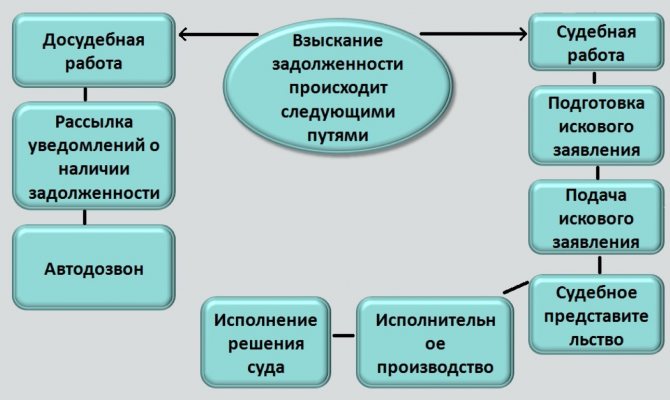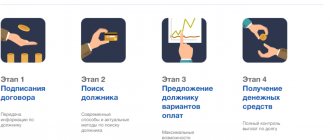Selling credit debt to a third party has a number of features that many borrowers are not familiar with. The fact that the bank has the right to sell the debt follows from the current legislation. The transfer occurs as a result of the conclusion of an assignment agreement. There is nothing unusual about this. Many borrowers are confused when they start receiving calls, SMS and letters from debt collectors after the court decision to collect the debt has entered into force and the writ of execution has been submitted to the FSSP.
Can a bank sell debts to collectors after a court decision? To whom should the debtor pay money in this situation? Let's take a closer look at the situation.
Conditions for assignment of rights to collectors
The grounds for assignment of rights under monetary obligations are regulated by several regulations. The most important of them is the Civil Code of the Russian Federation (Article 382). In addition to the Civil Code, the allowance of changes in the execution process is provided for in Art. 52 of Law No. 229-FZ.
The rules of the law provide that if the borrower is unable or unwilling to repay the loan, the original creditor: a bank or microfinance organization, has the right to sell the debt without the consent of the borrower. Moreover, such an opportunity is provided for the creditor at any stage of the contractual relationship. Including after the court decision has entered into force and the writ of execution has been submitted to the FSSP for execution.
If, before going to court, the collection agencies that bought the debts take independent steps to resolve the problem out of court, then after sending the writ of execution to the bailiffs, they have no right to interfere in their work.
It follows from this that when selling a debt after a trial, collectors do not have the right to call, send SMS, meet in person or send letters demanding repayment of the debt. A notice of the sale of loan debt must be sent to the borrower by the bank or microfinance organization. A similar notice must be sent to the bailiff in whose proceedings the writ of execution is located. After this, the bailiff makes a decision to replace the person in the obligation. It is approved by the chief bailiff.
The procedure for execution and the debt repayment schedule does not change. Collectors who purchased the debt do not have the right to interfere with the work of the bailiff or put pressure on the debtor.
Collectors demand repayment of other people's debts
Suddenly, collectors began to pester you about the debts of others: relatives, friends, or people you don’t even know. Is this legal and how to get rid of annoying messages and calls?
Claudia received a call from a collector. An unfamiliar voice muttered into the phone about some debt that needed to be paid off immediately. She did not take out any new loans, and the old ones had already been repaid. Claudia irritably informed the collector about this and hung up. But they called her again. And again. And again.
Unfortunately, in certain cases, debt collectors have every right to remind you of someone else’s debt. For example, if you acted as a co-borrower or guarantor on a loan. Sometimes communicating with debt collectors can save you from serious problems. So don't hang up and find out why they're bothering you.
Find out as many details as possible about why they are calling you.
If a debt collector starts talking about some debts, first find out all the details. If possible, record the conversation, but be sure to warn the other person that you are recording.
- Find out exactly who is calling and from what organization, on behalf of which creditor and about which debtor.
- Find out why you are concerned about the other person's debt and how you are financially connected to them.
- Ask them to send you a document by mail that confirms your obligations.
- Specify the details of the collection organization and the creditor: full name, INN and OGRN.
- If you receive a call from a representative not of the creditor itself, for example a bank or microfinance organization (MFO), but from an employee of a collection agency, it is worth checking his credentials. Ask to send you a document that confirms the collector’s right to communicate with debtors on behalf of the creditor.
Analyze the information
You may be worried about a debt that really has something to do with you. This happens if you acted as a guarantor or co-borrower on someone else’s loan or loan. Or they received an inheritance from a relative - and with it his debts. In these cases, the creditor has every right to demand that you repay the debt.
It happens that you are not formally obliged to respond to someone else’s loan or loan, but it is better to participate in solving the problem.
Claudia found out that her nephew took the loan and indicated her as a possible contact person when he signed the contract. Legally, Claudia has nothing to do with her relative; she is not obliged to answer for his loan. But the nephew owns part of the family dacha. If his share of real estate is seized and sold to pay off the debt, this could affect Claudia's interests. Perhaps she should buy her nephew's share of the property. This will allow Claudia not to share the dacha with new neighbors, and will help her nephew pay off his debts.
But it often turns out that you are not connected with the debtor by any financial interests or you are not familiar with him at all. The collector's call is an obvious misunderstanding. But to make sure of this, you need to do a few more steps.
Go to the lender's office
It is better to come to the bank, microfinance organization or consumer credit cooperative (CPC) that issued the loan in person.
If you really have to pay on a loan or loan, find out all the details: what debt is still remaining, what are the repayment terms, is it possible to create a payment schedule that is more convenient for you. Ask for a copy of the contract with all attachments.
It turned out that Claudia acted as a guarantor for her nephew’s loan and forgot about it. When the nephew stopped making payments on the loan, it was Claudia who had to repay the balance of the debt, pay interest and accrued fines on it. If the payments turn out to be too large for her, Claudia may try to negotiate with the bank to change the conditions. For example, ask to increase the loan term and reduce monthly payments. But the bank is not obliged to do this.
If an error has occurred and you have nothing to do with someone else’s loan, obtain a certificate of no debt from a bank, microfinance organization or credit card company. You can present it to collectors.
Contact the collector
If the debtor is not connected with you in any way, send statements to the collection company and the creditor: demand that your phone number be removed from the list of contacts of debtors and that calls be stopped regarding someone else’s debt.
Collectors have no rights
disclose information about the debt to third parties if the actual debtor has not given written consent to this. When they tell you about someone else's debt, they are breaking the law. Remind them of this.
If all this does not help - the calls and letters continue, move on to more drastic measures.
Complain to the authorities

Not to mention the cases when you are harassed about the loans of strangers. Such actions violate the laws “On Collectors” and “On Personal Data”. What can be done
:
- You can complain about the actions of a legal creditor to the Bank of Russia.
- For a black lender who does not have a license and is not on the register of the Bank of Russia, contact the police.
- For a collector - to the Federal Bailiff Service, the National Association of Professional Collection Agencies and Rospotrebnadzor.
- For violation of the Law “On Personal Data” - to Roskomnadzor.
- All complaints can be sent without leaving home - through the online reception desks of these organizations.
If these measures do not work, contact the police. Attach to the application all the data that you managed to collect: a certificate from the bank, microfinance organization or credit card company about the absence of debts, a recording of the conversation with the collector. Indicate that you have already contacted the creditor and debt collector, but this did not yield any results. The police will deal with the violators and the calls should stop.
What is important to know
Collection agencies have a very limited range of powers, which is defined by Part 1 of Art. 4 of Law No. 230-FZ. They have the right to exercise these powers at the pre-trial stage of interaction with the debtor.
Site Expert
Fasakhovva Elena Alexandrovna
Member of the Russian State Duma Committee on Non-Bank Credit Institutions. Engaged in bankruptcy proceedings since 2020.
Ask a Question
After filing a claim in court, especially after a court decision is made and the decision enters into legal force, the powers of the collectors lose force. They move on to the bailiff. It is he who decides in what order to collect the debt and whether to seize the debtor’s property.
However, there is a nuance in which collectors can again bother their former client and call after the bank has sold the debt to the collectors after a court decision. This may happen if the bailiff makes a determination that it is impossible to collect the debt. In this case, the writ of execution is returned to the creditor. In the future, he independently takes measures to repay the debt.
Selling debt: what are the benefits?
Selling a writ of execution to debt collectors and getting money means stopping incurring expenses for debt collection, paying legal fees and legal services.
A debt that is not collected goes rotten in the literal sense of the word. Purchasing debts by a collection agency saves the creditor from headaches
The benefit of a debt purchase transaction for a collection agency is to make a profit from collection. But the collection agency may not receive the amount of the debt. The risks of a debt collection agency purchasing a debt are compensated by the difference between the cost of the debt at the time of purchase and the amount received from the debtor in the end.
Do I need client permission?
Article 382 of the Civil Code of the Russian Federation does not provide for the obligatory consent of the debtor to sell the debt to a third party. It is sufficient if the loan agreement states that the borrower agrees to the transfer of personal data to a third party. As a rule, this assumption is a standard clause in the lending agreement.
The nuance of this rule is that the lender is obliged to notify the borrower of its intention to sell the debt to a third party. If this is not done, the borrower has the right to continue fulfilling obligations (debt repayment) to the original creditor.
In the case where the sale of the debt occurred after the transfer of the writ of execution to the bailiff, the responsibility for notifying the debtor of a change in the person in the obligation rests with the FSSP. At the same time, the debt repayment scheme agreed with the bailiff does not change. The new creditor, if a collection agency becomes one, does not have the right to demand a change in this scheme.
Establishing the reasons for violation of obligations to collect debt from the debtor
It is imperative to establish the reasons for the borrower’s violation of its obligations.
Dear readers! Our articles talk about typical ways to resolve legal issues with debts, but each case is unique. If you want to find out how to solve your particular problem, please use the online consultant form on the right or call . It's fast and free!
It is likely that the debtor has a strong intention to repay the debt, but is currently experiencing serious financial difficulties. In such a situation, it is recommended to negotiate with the debtor and provide a reasonable deferment of payment of the debt, subject to the execution of a receipt or agreement.
It is recommended that documents be notarized. However, you can limit yourself to a simple written form. It is necessary to pay special attention to the contents of the receipt (agreement). The document must contain the following information:
- Full name of the parties to the transaction;
- passport details of the parties and addresses;
- the amount of the loaned amount (written in numbers and words);
- the borrower's obligation to repay the money;
- procedure and deadline for debt repayment;
- possible sanctions for late payment (amount of penalty);
- date of document preparation;
- signatures of the parties with transcripts.
It is recommended to draw up the document in the presence of 2 witnesses who certify the receipt with their signatures.
The presence of a receipt or written agreement significantly increases the lender's chances of repaying debts. However, it is not always possible to persuade an unscrupulous borrower to draw up such a document, which complicates the position of the lender. In such a situation, you will need to collect other evidence of the existence of a debt in accordance with Art. 162 of the Civil Code of the Russian Federation.
How you can repay the debt yourself, watch this video:
Extrajudicial ways to collect debt
In many situations, the return of complex debts that are not supported by documents can be accomplished without going to court. A personal meeting, a calm interview and a joint search for solutions to the problem are useful if a person is really in a difficult financial situation, but is trying to collect the necessary amount and repay the debt, then he can be asked to make an advance payment and pay the rest later.
It may be worth agreeing to pay the debt in installments. This option is not very convenient for the lender, but sometimes it is the only real way to return the money in the current circumstances. It should be remembered that debt collection in court can take quite a long time.
Verbal pressure rarely has the desired effect when the borrower deliberately avoids returning the money.

Action plan for debt repayment.
In some cases, the assistance of a close relative or other individual who enjoys authority with the borrower (friend, colleague, boss) is effective. In this situation, it is worth using all possible methods, so you should negotiate with a person close to the borrower and ask him for help.
Help from collectors for the return of complex debt from an individual
Some defrauded creditors are thinking about turning to debt collectors. But how can you collect debt with the help of third parties without harming yourself? You will have to pay a considerable amount for the services of professionals, so it makes sense to turn to the help of an agency only if the amount of debt is very large.
There are collection agencies that operate on completely legal grounds. When filling out an application, the client will have to provide the personal data necessary for work and certain information about his financial situation.
However, it is difficult for an unsophisticated person to distinguish real professionals from bandits or scammers. The lender should think several times about the possible consequences before deciding to contact debt collectors.
Will the police help repay the debt?
Contacting the police with a report of fraud is unlikely to result in the initiation of a criminal case. Fraud is an intentional crime, and in practice it is very difficult to establish the presence of intent in the borrower’s actions.
However, the application will be accepted, and a conversation between an authorized law enforcement official and the negligent borrower will take place, which in itself can have a positive effect.
Refusal to initiate a criminal case does not prevent filing a claim in court. In addition, a decision to refuse to initiate a criminal case may be evidence in civil proceedings. For example, if law enforcement agencies determine the existence of a debt, but there is no reliable information about the amount of debt.
What debts does the bank sell to collectors?
The decision to sell debt to a collection agency is made by the bank independently based on their internal credit policy towards clients and correspondents. First of all, they strive to get rid of small debts, the costs of collecting which are comparable to the costs that the bank will be forced to incur if it does this on its own. This takes into account:
- amount of debt;
- the financial condition of the borrower at the time of applying for the loan;
- the presence of collateral, guarantors or co-borrowers;
- location of the debtor;
- his desire to make contact with the creditor.
The smaller the loan amount, the higher the likelihood that when payments stop, the bank will sell such debt.
What to do if this happens
Selling a debt to a collection agency brings a number of inconveniences associated with persistent reminders and demands to repay the debt. Since 2020, the number of such reminders is clearly regulated by law. The agency can no longer, at its discretion, at any time, call the debtor, threaten or demand the sale of property to pay off the debt. The number of such methods of interaction as a personal meeting with the debtor is also sharply limited.
If, after handing over the writ of execution to the bailiffs, the debtor receives a call from debt collectors demanding repayment of the debt, it is necessary to immediately notify the bailiff service, which is entrusted with monitoring the activities of debt collection structures. It is enough to write a complaint against the agency for the illegal actions to stop.
In addition to the FSSP, you can complain to Rospotrebnadzor, the police, the prosecutor's office or NAPKA.
What you need to know: Several effective ways to complain about debt collectors
Filing an appeal
An appeal against a court decision is one of the ways to protect a right that a borrower has the right to use. You can submit it within 1 month after the announcement of the court decision (Article 321 of the Code of Civil Procedure).
Any court decision with which for one reason or another the debtor does not agree is subject to appeal. It must be motivated. It must contain an indication that such a decision puts the borrower in less favorable conditions for repaying the debt or violates his basic civil rights if the bank transferred the debt.
The appeal is subject to payment in the amount of 50% of the state fee paid when filing the statement of claim. Claims for the collection of overdue loan debt are related to property, so the amount of the fee can be quite large for a borrower who is unable to repay the loan debt. Therefore, you should think carefully and consult with a lawyer before appealing a court decision, so as not to waste money and time in vain.
How to collect a debt against a receipt in court?
After the claim is filed in court, the case will be considered in accordance with the requirements of the Civil Procedure Code (Civil Procedure Code of the Russian Federation), that is, a trial with the participation of both parties. It should be understood that the case can be considered for quite a long time, and practice shows that debtors, by not appearing at the court hearing, deliberately delay the process. It is also necessary to mentally prepare for the fact that a dishonest debtor will try by all means to challenge the receipt. This is where the lender will need other evidence of the transfer of money. The debtor may claim that the receipt does not contain his signature, so the court may require a corresponding handwriting examination of the receipt for receipt of funds, which will further delay the case. However, if in the end the case is decided in favor of the lender, then the costs of all examinations will fall on the shoulders of the debtor by court decision.
When the case is considered and the court satisfies the creditor's demands, the court decision will be enforced from the moment it enters into legal force. Federal Law No. 229-FZ of October 2, 2007 “On Enforcement Proceedings” (as amended and supplemented) regulates the execution of court decisions against defaulting debtors. In court, the creditor who filed a claim for debt collection is given a writ of execution, which he transfers to the bailiff service to initiate enforcement proceedings against the borrower who has not repaid the debt on time.
The bailiffs send the borrower-defendant a corresponding resolution, after receiving which the debtor has the opportunity and right to voluntarily repay the debt within five days. In the event that such a measure does not have an impact, enforcement measures will be applied to the debtor. Among them are:
- Seizure of funds received by the debtor from various sources (including wages);
- Imposition of penalties on property owned by the debtor (What property do not bailiffs have the right to take away for debts?);
- Imposition of penalties on the property rights of the defaulter.
In conclusion, I would like to say that if you have a correctly drawn up receipt of funds, in most cases it is possible to collect the debt. Before going to court, the creditor needs to carefully consider the available pre-trial debt collection options and choose the most optimal ones for his specific situation. Remember - a correctly drawn up receipt greatly increases the creditor’s chances of repaying the debt.
Selling an individual's debt by receipt is a fairly simple procedure that only requires drawing up an appropriate contract/agreement (assignment). Basically, lenders sell such debts to collection agencies, less often to banks, and third-party organizations.
How to Simply Recommend
There are often cases when a person gives his friend or relative a certain amount of money against a receipt, which indicates the terms of return and payment periods. If the borrower pays his debts in bad faith and the time delay only increases, there is a way out to sue the debtor or sell the debt to third parties.
The procedure for selling debt is simple. This is mainly done by collection agencies. Then the lender quickly receives money in his hands, and the collectors already “knock out” the money in their own ways.
To sell an individual’s debt, it is necessary to conclude an assignment, or otherwise an agreement on the assignment of the right of claim between the lender and the collection agency. An example of such an agreement can be found on the websites of collectors. It is worth remembering that in the agreement for the assignment of the right of claim, the terms of payment of obligations that were specified in the receipt cannot be changed (that is, payment terms, interest, fixed amount of payments).
The creditor can sell the debt to collectors at any stage of collecting an overdue payment, even if the collection goes through the court.
According to the law, the debtor's consent is not required when transferring a debt. However, either the collector or the lender are required to warn in writing about the transfer of debt. In this case, it is necessary to attach an agreement on the assignment of the right of claim, according to which the debt was transferred. Until the provision of evidence of the transfer of the right to claim the debt, he is not obliged to pay collectors.
There is one more nuance. If the receipt for the debt obligation was notarized, then the assignment agreement must also be certified by a notary.
In general, not only collectors, but also any other individual, bank, or third-party organization can buy out an individual’s debt. The main thing is to understand what benefits the “reseller” of the debt will have. The larger the amount of debt and the lower the value of the debt when transferring the right of claim, the greater the chances of redemption. Typically, the redemption price reaches 10-15% of the debt amount. Sometimes you can negotiate terms up to 50%, and sometimes up to 80%. This depends on several factors:
- borrower's solvency;
- debt amounts;
- presence or absence of a writ of execution;
- loan collateral;
- availability of other loans.
Lenders sell an individual's debt in rare cases. On the one hand, this is due to the fact that such debts are sold at a price that is lower than the debt. On the other hand, debt repayment can be achieved through court. To do this, claims are sent to the debtor in writing, and then the procedure for going through the courts follows.
Basically, the creditor transfers the debt to third parties when he no longer expects the debt to be repaid.
Offer from our partner
How to sell an individual's debt using a receipt
Forms of debt sale
There are two forms of debt sale:
- Assignment of the right of claim (assignment) is the most common form widely used by banks and microfinance organizations;
- Factoring is a form of transaction with an overdue cash loan in which the collection agency acts as an intermediary for collection, but the creditor does not change. They still remain the bank, and the collector receives a percentage as a reward (usually in the amount of penalties provided for in the contract).
Read further:
What to do if the loan debt was transferred to collectors
How and at what cost to sell an individual’s debt to collectors
How long does it take for microfinance organizations to transfer debt to collectors and how to get rid of them?
Collectors demand repayment of debt after the statute of limitations has expired
What time do debt collectors have the right to call?
What happens if you don't pay debt collectors?
Sale of debt under a writ of execution
The sale of debt under a writ of execution is one of the types of assignment. A person or organization that clearly has the right to collect a debt, but for one reason or another does not want to waste time waiting for the obligation to be fulfilled, can sell such debt. In this case, the writ of execution is transferred to the buyer, who independently decides how to dispose of the debt. Should I submit it for execution to the FSSP or take independent measures to collect the debt?
Banks extremely rarely decide to sell debt to collectors based on writs of execution. Too much time passes before a court decision is made, and this is not beneficial for them.
Collecting money against a receipt by selling debt to collectors
There are situations when the creditor, for some reason, does not want to personally meet with the debtor to discuss the situation, the creditor does not want to send claims to the debtor in writing, and even more so to seek help from the courts, that is, to collect money on a receipt reached a dead end. In such situations, there is an alternative option for collection - assignment of the right to claim the debt. Today, there is an impressive number of collection firms engaged in purchasing debt obligations of individuals. What are the positive aspects for the lender here:
- After concluding an agreement on the assignment of claims, the lender immediately receives some part of the debt (collectors buy out debts at a “discount”);
- The creditor no longer needs to meet with the dishonest debtor;
- The creditor does not need to send written claims to the debtor;
- There is no need to go to court to “waste your nerves” and time on legal proceedings.
That is, after selling the debt, you completely relieve yourself of all issues related to collecting the debt on the receipt; then the collection company that bought the debt will deal with it, and you will receive your money, minus a certain percentage established by the collection agency.










